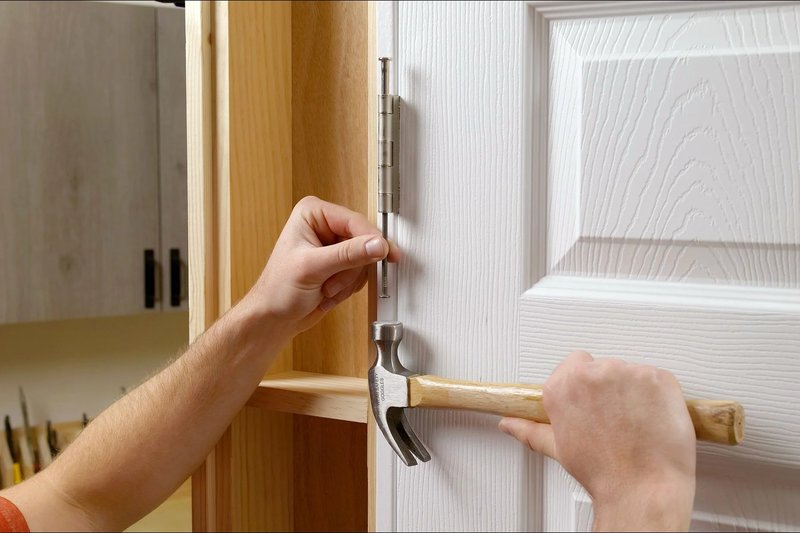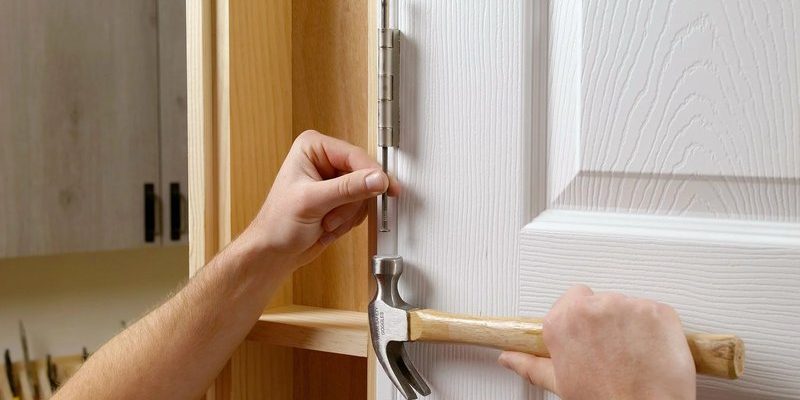
Common Causes of Door Hinge Clicking
When you’re hearing a click from your door hinges, it’s often because of one of two main issues: a loose pin or wear. Both can create that irritating noise, but they stem from different problems.
Loose Pins: When the pin that holds the hinge together isn’t secured tightly, it can rattle around a bit. Think of it like a loose screw in a chair; every time you put weight on it, you hear that annoying little creak. A loose pin in a hinge works the same way, causing that click when the door moves.
Wear and Tear: Over time, hinges can become worn out from constant use. Just like your favorite pair of shoes might get scuffed, the metal can lose its smooth edge. This wear can form gaps that lead to the hinge not moving fluidly, resulting in the clicking noise.
These two problems can affect any door in your home, from the bathroom to your bedroom. The good news? Most do-it-yourselfers can fix these issues without calling in a professional.
How to Identify a Loose Pin
You’ve narrowed down the sound to a possible loose pin. Now what? Here’s how to identify if this is indeed the issue with your door hinge.
First, gently wiggle the door. If you notice movement in the hinge and hear that telltale clicking sound, it’s likely the pin is loose. In some cases, you might even see the pin shifting in the hinge itself.
Next, check the screws. Sometimes, the issue isn’t with the pin but with the screws that hold the hinge in place. If these screws are loose, they won’t hold the hinge tight against the door frame. Grab a screwdriver and give them a little tighten.
Also, give the hinge a visual inspection. Look for any signs of rust or damage. If a hinge looks rusty or worn down, it may need to be replaced entirely.
Steps to Fix a Loose Door Hinge Pin
If you’ve confirmed that a loose pin is the issue, fixing it is pretty straightforward. Here’s how to tackle this problem step by step.
- Gather Your Tools: You’ll need a screwdriver, some lubricant (like WD-40), and possibly a hammer. A replacement pin can come in handy if the old one is too damaged.
- Remove the Hinge Pin: Carefully pry the pin out using the hammer if it’s stubborn. Make sure to keep the hinge steady, so it doesn’t get damaged.
- Clean and Lubricate: Once the pin is out, clean it with a cloth and apply a bit of lubricant. This helps it slide back in smoothly and reduces future noise.
- Reinsert the Pin: Push the pin back into the hinge and tap it gently with the hammer until it’s seated properly. Make sure it’s tight but not too tight to cause bending.
With these steps, your door should be back to its silent self in no time!
When to Replace Hinges Instead of Repairing
Not every hinge can be saved, and sometimes, it’s smarter to replace rather than repair. Here are a few signs that tell you it’s time for a new hinge.
Severe Wear and Tear: If the hinge shows visible signs of damage, like rust, chips, or cracks, replacing it is a good idea. A damaged hinge can lead to door misalignment and other issues.
Persistent Noise After Repair: If you’ve tightened the pin but the clicking persists, it might be time for a new hinge. Sometimes, wear happens at the hinge plate itself, which can’t be fixed by just tightening.
Frequent Use: For doors that see a lot of traffic, such as entryways or bathroom doors, investing in a sturdy and high-quality hinge can save you future headaches. If you notice clicking noises often, it may be worth upgrading.
If you find yourself in this situation, take your time to measure properly so you can get the right hinge size for your door.
Preventive Measures for Quiet Hinges
The best way to avoid issues with clicking hinges is to take preventive measures. Here are a few tips to keep your interior door hinges quiet.
Regular Maintenance: Make it a habit to check your hinges every few months. A quick visual inspection for rust and a little lubricant can go a long way.
Use Quality Hinges: If it’s time to replace, choose hinges made from durable materials. Stainless steel or brass options are often sturdier and more resistant to wear.
Watch the Weight: If you’re planning to install a heavier door, make sure to use hinges that can support the weight. This reduces stress on the hinge and prevents eventual wear.
Taking these steps can save you from dealing with annoying clicks in the future.
Hearing your interior door hinges click can be bothersome, but understanding why this happens helps you tackle the issue confidently. Most of the time, it’s just a loose pin or wear and tear on those hardworking hinges. With a few simple tools and some basic maintenance, you can silence those clicks and restore peace to your home.
So, the next time you find yourself distracted by that irritating sound, you’ll know exactly what to do. Whether it’s tightening screws, lubricating a pin, or investing in quality replacements, you have the knowledge to keep your doors—and your sanity—intact.
